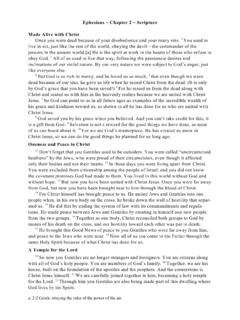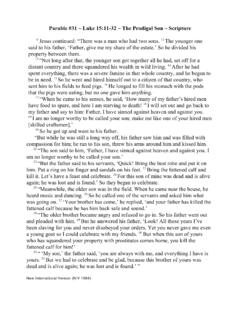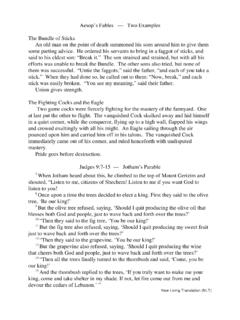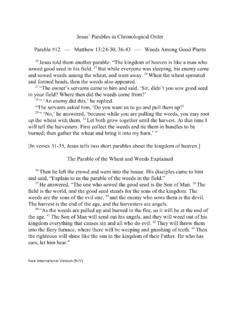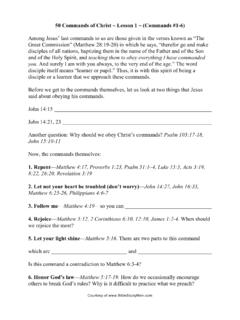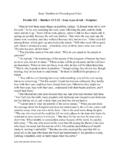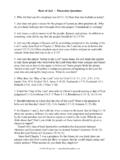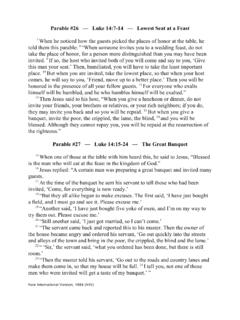Transcription of Jesus’ Parables in Chronological Order Parable #33 ~ Luke ...
1 Jesus' Parables in Chronological Order Parable #33 ~ Luke 16:19-31 ~ The Rich Man and Lazarus ~ Scripture 19. There was a rich man who was dressed in purple and fine linen and lived in luxury every day. 20 At his gate was laid a beggar named Lazarus, covered with sores 21 and longing to eat what fell from the rich man's table. Even the dogs came and licked his sores. 22. The time came when the beggar died and the angels carried him to Abraham's side. The rich man also died and was buried. 23 In hell, where he was in torment, he looked up and saw Abraham far away, with Lazarus by his side. 24 So he called to him, Father Abraham, have pity on me and send Lazarus to dip the tip of his finger in water and cool my tongue, because I am in agony in this fire.
2 '. 25. But Abraham replied, Son, remember that in your lifetime you received your good things, while Lazarus received bad things, but now he is comforted here and you are in agony. 26 And besides all this, between us and you a great chasm has been fixed, so that those who want to go from here to you cannot, nor can anyone cross over from there to us.'. 27. He answered, Then I beg you, father, send Lazarus to my father's house, 28. for I have five brothers. Let him warn them, so that they will not also come to this place of torment.'. 29. Abraham replied, They have Moses and the Prophets; let them listen to them.'. 30. No, father Abraham,' he said, but if someone from the dead goes to them, they will repent.
3 '. 31. He said to him, If they do not listen to Moses and the Prophets, they will not be convinced even if someone rises from the dead.' . New International Version (NIV). Parable #33 ~ Luke 16:19-31 ~ The Rich Man and Lazarus ~ Discussion 1. What do you imagine heaven and hell will be like? What do your friends think? 2. Jesus tells the Parable in Verses 17:19-31 to the Pharisees. What did the Pharisees believe that wealth represented? 3. What does the Parable tell us about Lazarus the beggar? From what happened to him in Verse 22, what else do we know about him? 4. Did the rich man go to hell because he did not give food to Lazarus? (Read verses 19-21 very carefully.)
4 5. What does this Parable reveal about heaven and hell? 6. How does this story fit in with the Prosperity Gospel being widely preached today? 7. The rich man thought his brothers would believe someone risen from the dead more than the scriptures. Abraham said they would not. What's the parallel today? 8. Do you really believe in the reality of hell? If so, what stops you from sharing your faith with others? 9. How would this Parable encourage Christians who are sick, poor, or disadvantaged? 10. Why does God not always provide miracles or healing to help people believe in him? 11. This Parable focuses on earthly riches versus things of eternal value.
5 What things have eternal value? How can you focus more on them than earthly riches? Courtesy of Parable #33 ~ Luke 16:19-31 ~ The Rich Man and Lazarus ~ Leader 1. What do you imagine heaven and hell will be like? What do your friends think? What we often assume about Heaven What the Bible says about Heaven Non-Earth New Earth Unfamiliar, otherworldly Familiar, earthly Disembodied Resurrected (embodied). Foreign Home (all the comforts of home with all the innovations of an infinitely creative God). Leave favorite things behind Retaining the good; finding the best ahead No time and space Time and space Static Dynamic Neither old nor new; strange and unknown Both old and new Nothing to do; floating on the clouds A God to worship and serve; a universe to rule; purposeful work to accomplish; friends to enjoy No learning or discovery; instant, complete An eternity of learning and discovery knowledge Boring Fascinating Loss of desire Continuous fulfillment of desire Absence of the terrible (but presence of little Presence of the wonderful (everything we we desire) desire and nothing we don't).
6 2. Jesus tells the Parable in Verses 17:19-31 to the Pharisees. What did the Pharisees believe that wealth represented? Wealth represented position, power, prestige more or less the same things it means to many (most) people today. Also, the Pharisees, thought they deserved the honored places in the synagogues, and at feasts. They loved salutations and greetings in market places, and for other men to call them Rabbi.. 3. What does the Parable tell us about Lazarus the beggar? From what happened to him in Verse 22, what else do we know about him? He was not only poor but he had some sort of festering sores on his skin. He was obviously weak if he was unable to stop the dogs from licking his sores.
7 But inside, he was a Godly and righteous man or angels would not have carried him to heaven. Matthew Henry says, It is often the lot of some of the dearest of God's saints and servants to be greatly afflicted in this world. In contrast to the rich man (and unique in all the Parables ), Jesus referred to him by name, probably done just to give us a hint, for it is nothing more, of the personal character of the poor sufferer who in the end was so blessed. The Greek name Lazarus is derived from two Hebrew words, El-ezer ( God-help ), shortened by the rabbis into Leazar, whence Lazarus. 4. Did the rich man go to hell because he did not give food to Lazarus?
8 (Read verses 19-21 very carefully.). The rich man is introduced by Jesus without any details regarding his age or place of residence and he is nameless, too! His ordinary apparel seems to have been purple and fine linen. In those days, purple was a precious and rare dye, a purple garment was often a royal gift, and was worn only by princes and nobles of very high degree. It seems that everything that could make life splendid and joyous was in profusion. We are not told that the rich man got his wealth by fraud, or oppression. Jesus doesn't say that the rich man did Lazarus any harm, but we do not find that he had any compassion in him either. The wrong of this rich man was his providing for himself only.
9 Interestingly, it is not that he disobeyed one of the ten commandments, deliberately or inadvertently, 5. What does this Parable reveal about heaven and hell? First of all, Jesus teaches here that heaven and hell are both real, literal places. Sadly, many preachers today shy away from uncomfortable topics such as hell. Some even teach universalism the belief that everyone goes to heaven. Yet Christ spoke about hell a great deal, as did Paul, Peter, John, Jude, and the writer of Hebrews. The Bible is clear that every person who has ever lived will spend eternity in either heaven or hell. This story also illustrates that once we cross the eternal horizon, that's it.
10 There are no more chances. The transition to our eternal state takes place the moment we die (2 Corinthians 5:8; Luke 23:43; Philippians 1:23). When believers die, they are immediately in the conscious fellowship and joys of heaven. When unbelievers die, they are just as immediately in the conscious pain, suffering, and torment of hell. Notice the rich man didn't ask for his brothers to pray for his release from some purgatorial middle ground, thereby expediting his journey to heaven. He knew he was in hell, and he knew why. That's why his requests were merely to be comforted and to have a warning sent to his brothers. He knew there was no escape. He was eternally separated from God, and Abraham made it clear to him that there was no hope of ever mitigating his pain, suffering, or sorrow.
